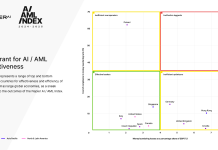The United Arab Emirates (UAE) has made significant strides in its anti-money laundering (AML) and combating the financing of terrorism (CFT) frameworks.
Recently, it was removed from the Financial Action Taskforce’s (FATF) grey list, marking a pivotal moment in its financial regulatory journey. The grey list includes jurisdictions under increased monitoring to ensure they rectify strategic weaknesses within agreed timelines. The UAE’s exit from this list signals strengthened regulatory measures and a commitment to global financial security standards.
Napier AI, a London-based RegTech specialising in financial crime compliance, recently delved into what the UAE’s removal from the grey list will mean for financial institutions.
The FATF, an international body established to combat money laundering, places countries on the grey list that show deficiencies but are actively working towards reform. This listing encourages countries to enhance their AML/CFT measures under global scrutiny, aiming to foster safer financial environments worldwide.
In March 2022, the UAE was grey-listed due to identified shortcomings in its financial monitoring systems. Recognizing the critical implications of this status, the UAE embarked on a rigorous reform agenda. By February 2024, substantial reforms had been implemented, which included enhancing risk-based mitigation transparency, improving regulatory oversight, and bolstering international cooperation. These comprehensive measures were pivotal in the decision to remove the UAE from the grey list.
The removal of the UAE from the grey list heralds a new era for its financial sector. It not only signifies reduced scrutiny from FATF but also boosts the UAE’s reputation as a secure and trustworthy financial hub. This change is likely to lower transaction costs and attract more international business and investment, mitigating previous risks associated with sanctions or financial restrictions.
Moreover, the UAE’s financial landscape is expected to see a surge in technological advancements aimed at compliance and efficiency. Financial institutions are now focusing on scalable and future-proof technologies, such as advanced user interfaces and no-code sandbox environments, to adapt quickly to new regulatory challenges and prevent financial crimes effectively.
While the UAE celebrates this achievement, it remains vigilant. The journey towards maintaining and enhancing its AML/CFT measures continues, aiming to prevent any potential relisting by FATF. The ongoing commitment to robust financial crime compliance solutions will be crucial for sustaining and building on the current progress.
Read the full story here.
Keep up with all the latest FinTech news here.
Copyright © 2024 FinTech Global
Copyright © 2018 RegTech Analyst






